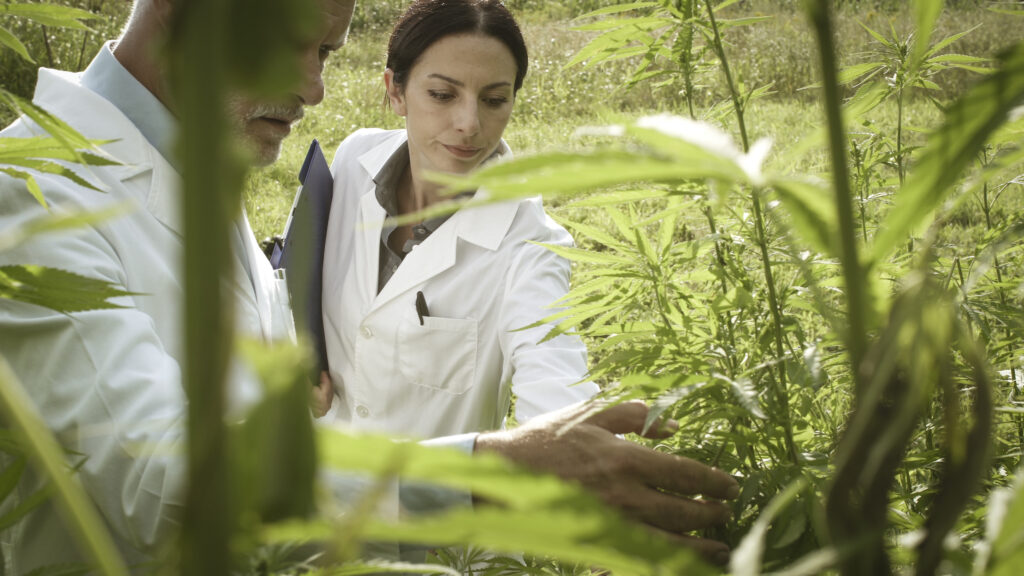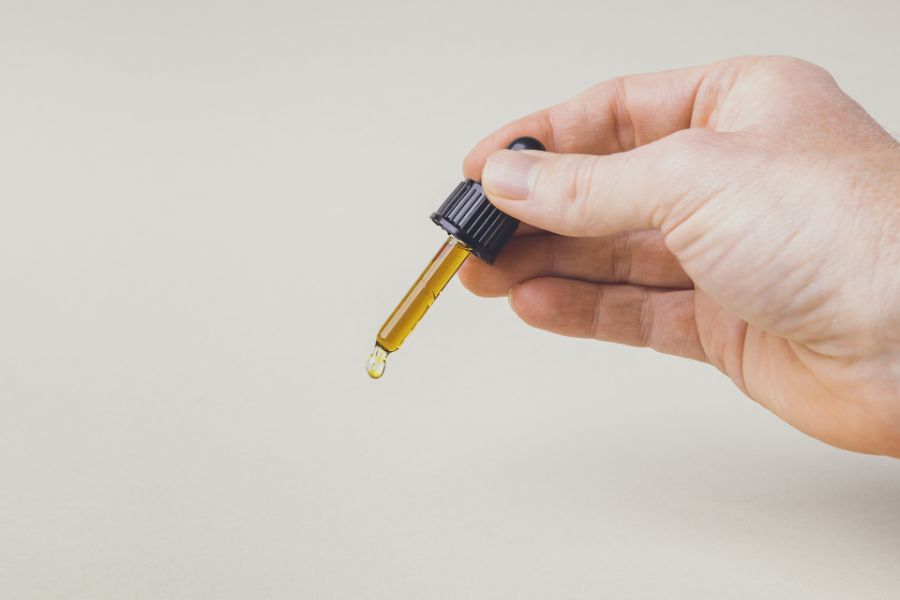Introduction to CBD
CBD is one of many naturally occurring compounds found within the hemp plant1. These compounds, referred to as cannabinoids, possess ‘therapeutic effects’ due to their interaction with an influential biological system called the endocannabinoid system2. CBD can be ingested in a variety of forms and reassuringly doesn’t induce the ‘high’ commonly associated with other cannabis or marijuana plants, which is caused by a different cannabinoid called THC3. CBD products are required by law to possess a negligible and often undetectable amount of THC, meaning you can safely reap the benefits of this multifaceted plant without the risk of psychotropic side effects4.
Due to its anti-inflammatory properties, CBD has been explored as a treatment for Arthritis, a common inflammatory condition. In this article, we delve into the research behind this idea and discuss the potential CBD benefits for arthritis.

What is Arthritis?
Arthritis is a general term given to joint pain or joint disease. According to the Arthritis Foundation, there are actually more than 100 types of arthritis and related conditions, so it is no surprise that it’s the leading cause of disability in America. The condition is more common among women and becomes more common as people get older, but the condition is not strictly limited to the older generations5.
CBD and Arthritis Research
CBD oil for Osteoarthritis:
Osteoarthritis (OA) is the most common form of arthritis and occurs when cartilage between bones breaks down, which can result in joint pain, swelling and reduced mobility. The risk of developing OA increases with age because your joints become weathered and fragile, but it can also come about due to injury, obesity and genetics, among other things6.
Using CBD oil for arthritis of this type has been explored in studies with both human and animal test subjects, with varying results. A 2020 review of the therapeutic and pharmacologic potential of CBD found that “cannabinoids such as CBD, in both an anti-inflammatory and immunosuppressive manner, have potent anti-arthritic effects with a subjectively diminished adverse risk profile”7. However, this was based heavily on animal test subjects and in contrast, a 2021 human study found no significant perceived benefit of CBD in the treatment of osteoarthritis8.
Unfortunately, osteoarthritis is related to a breakdown in the physical matter within your joints, so it is extremely difficult to find a ‘cure’, but there is an abundance of studies which conclude that CBD is a viable treatment for the pain and inflammation that osteoarthritis will most likely cause. For more information on the mechanisms by which CBD influences pain and inflammation, please read our article “CBD Oil for Pain: Research, Side Effects, Dosage & Case Studies”.
CBD oil for Rheumatoid Arthritis:
Rheumatoid arthritis (RA) occurs when a person’s immune system malfunctions and attacks the lining of the joints, also known as the synovium. This destruction of the synovium then leads to joint pain and inflammation, which is perceived as arthritis9. RA is distinguished from other arthritic problems by the presence of rheumatoid arthritis synovial fibroblasts (RASFs). Scientists have found that RASFs play an active role in the initiation and progression of rheumatoid arthritis, as well as the aforementioned immune system response10.
Interestingly, the discoveries of a recent study suggest that CBD may exhibit anti-arthritic qualities which are specifically pertinent to RA sufferers, displayed by its preferential targeting of activated, pro-inflammatory RASFs. To conclusively prove such a discovery would pose great potential for CBD as a treatment for rheumatoid arthritis, not only as an anti-inflammatory that deals with the symptoms, but as an anti-RASF response which deals with a root cause of the problem.

CBD for Psoriatic Arthritis:
Psoriatic arthritis (PsA) is an inflammatory form of arthritis which is linked to psoriasis, a chronic multisystem inflammatory disease that usually affects the skin and joints 12 13. Psoriatic arthritis and psoriasis can be extremely debilitating, causing mental well-being and social issues beyond the physical aspects of the illness.
Unfortunately, psoriasis and psoriatic arthritis are currently incurable and require much further research, but CBD’s anti-inflammatory properties are being studied for their potential to remediate the symptoms, making life more bearable for those suffering from PsA 14 15.
CBD for Ankylosing Spondylitis:
Ankylosing spondylitis (AS) is a chronic inflammatory disease focused primarily on spinal joints, causing severe chronic pain. We currently understand that AS is an autoimmune disease, similar to rheumatoid arthritis, but the specific causes of AS are yet to be discovered and it remains incurable for the time being16.
Suffering from an incurable disease, the best one can hope for is to find a satisfying, sustainable and healthy remedy for the symptoms of ankylosing spondylitis. Since recent developments in CBD research regarding its utility in the field of arthritic treatment, many have turned to this plant-based therapy as an alternative solution.
One of those forward thinking individuals is Medicanna founder, Olivier Reiner. When asked why he takes CBD, he replied:
“Over the years I’ve tried many different remedies, supplements and dietary alterations, and whilst some have been more successful than others, I’ve found that CBD is the most effective option for easing my symptoms of Ankylosing Spondylitis.”
To read more about this CBD success story, click here.
The Best Way to Take CBD for Arthritis
Most research regarding CBD and its efficacy in the treatment of arthritis are based on topical and transdermal application i.e. on the skin. Topical CBD products allow the cannabidiol to be absorbed more directly to the area of most need, rather than the holistic benefits which can be found when using an oil dropper. For sufferers of arthritis, this direct translation of the benefits of CBD may be desirable.

However, as is the case with many matters of health and well-being, consumers respond subjectively to CBD treatments and we recommend testing various applications. For example, looking at a psoriasis sufferer, it may be the case that a topical cream works best for reducing inflammation in the arthritic area, but an oil dropper is more sufficient in addressing health-based anxiety that they experience.
Safety of CBD & Side Effects of Using CBD for Arthritis
It is extremely rare that people experience side effects from taking CBD and studies have shown “Cannabidiol (CBD) attenuates inflammation and pain without side-effects”17. However, As with any natural substance, there is the potential for unwanted side effects.
Possible side effects include a dry mouth, diarrhoea, fatigue, and drowsiness. Perhaps the most pertinent consideration when taking CBD is the impact it might have on other medication18. For those on prescribed medicines, it is important to speak to your doctor before introducing CBD into your daily routine19.
Mixing CBD with Common Arthritis Medications
As mentioned, possibly the biggest risk associated with CBD usage arises when mixing it with other medications. If you are currently taking other medication for arthritis, we recommend speaking to a healthcare professional. As it stands, there is insufficient conclusive research into the specific reactions between arthritis medications and CBD. However, when we are in a position to confidently provide further insight, we will do just that.
CBD Dosage for Arthritis
As we mentioned earlier, referring to ‘arthritis’ as a whole creates complications for the validity of our insights. CBD dosage in general is a tricky subject because, at this point, there are no concrete guidelines for consumers to follow based on the desired effect. Furthermore, based on the complex variation among types of arthritis, the CBD dosage for rheumatoid arthritis may be wildly different to the dosage for osteoarthritis.
UK government guidelines recommend using no more than 70mg of CBD per day, but up until that amount, it is common for consumers to experiment with incrementally increasing dosages until they find a dosage that works for them. We should add that this method lacks sufficient clinical proof, but anecdotal evidence suggests a level of efficacy 20.

So can we say CBD ‘works’ for Arthritis?
Based on the body of research available within this field, it seems clear that CBD poses beneficial potential in the treatment of arthritis symptoms and causes. However, there is a severe lack of clinical research that would allow healthcare authorities to recommend such therapeutic avenues.
Furthermore, anecdotal evidence and consumer reports have shown promise, with many customers reporting improvements to their arthritis, at varying levels. As with many subjects in the field of CBD and its many prospective applications, further research is required to verify such claims.
Sources:
1 Shannon, S. Lewis, N. Lee, H. & Hughes, S. (2019) Cannabidiol in Anxiety and Sleep: A Large Case Series. The Permanente journal, 23, 18–041. Available at: https://doi.org/10.7812/TPP/18-041
2 Marco E, García-Gutiérrez M, Bermúdez-Silva F, Moreira F, Guimarães F, Manzanares J, Viveros M. (2011) Endocannabinoid system and psychiatry: in search of a neurobiological basis for detrimental and potential therapeutic effects. Frontiers in Behavioral Neuroscience, 5, 63. Available at: https://www.frontiersin.org/article/10.3389/fnbeh.2011.00063
3 Martínez, V. Iriondo De-Hond, A. Borrelli, F. Capasso, R. Del Castillo, M. D. & Abalo, R. (2020). Cannabidiol and Other Non-Psychoactive Cannabinoids for Prevention and Treatment of Gastrointestinal Disorders: Useful Nutraceuticals?. International journal of molecular sciences, 21(9), 3067. Available at: https://doi.org/10.3390/ijms21093067
4 Alphagreen (2021) Regulating CBD in the UK: FSA guidance & legislation, Alphagreen. Available at: https://alphagreen.io/food-standards-agency-cbd-novel-food
5 Arthritis Foundation. (2021) What is Arthritis? Available at: https://www.arthritis.org/health-wellness/about-arthritis/understanding-arthritis/what-is-arthritis
6 Arthritis Foundation (2021) Osteoarthritis. Available at: https://www.arthritis.org/diseases/osteoarthritis
7 Gusho, C. A., & Court, T. (2020). Cannabidiol: A Brief Review of Its Therapeutic and Pharmacologic Efficacy in the Management of Joint Disease. Cureus, 12(3), e7375. https://doi.org/10.7759/cureus.7375
8 Deckey, D. G., Lara, N. J., Gulbrandsen, M. T., Hassebrock, J. D., Spangehl, M. J., & Bingham, J. S. (2021). Prevalence of Cannabinoid Use in Patients With Hip and Knee Osteoarthritis. Journal of the American Academy of Orthopaedic Surgeons. Global research & reviews, 5(2), e20.00172. https://doi.org/10.5435/JAAOSGlobal-D-20-00172
9 Arthritis Foundation. (2021) Rheumatoid Arthritis: Causes, Symptoms, Treatments and More. Available at: https://www.arthritis.org/diseases/rheumatoid-arthritis
10 L. C. Huber, O. Distler, I. Tarner, R. E. Gay, S. Gay, T. Pap, Synovial fibroblasts: key players in rheumatoid arthritis, Rheumatology, Volume 45, Issue 6, June 2006, Pages 669–675, https://doi.org/10.1093/rheumatology/kel065
11 Lowin, T., Tingting, R., Zurmahr, J. et al. Cannabidiol (CBD): a killer for inflammatory rheumatoid arthritis synovial fibroblasts. Cell Death Dis 11, 714 (2020). https://doi.org/10.1038/s41419-020-02892-1
12 Dafna D. Gladman, PSORIATIC ARTHRITIS, Rheumatic Disease Clinics of North America, Volume 24, Issue 4, 1998, Pages 829-844, ISSN 0889-857X, https://doi.org/10.1016/S0889-857X(05)70044-2
13 Kim, W. B., Jerome, D., & Yeung, J. (2017). Diagnosis and management of psoriasis. Canadian family physician Medecin de famille canadien, 63(4), 278–285
14 Baswan, S. M., Klosner, A. E., Glynn, K., Rajgopal, A., Malik, K., Yim, S., & Stern, N. (2020). Therapeutic Potential of Cannabidiol (CBD) for Skin Health and Disorders. Clinical, cosmetic and investigational dermatology, 13, 927–942. https://doi.org/10.2147/CCID.S286411
15 Scheau, C., Badarau, I. A., Mihai, L. G., Scheau, A. E., Costache, D. O., Constantin, C., Calina, D., Caruntu, C., Costache, R. S., & Caruntu, A. (2020). Cannabinoids in the Pathophysiology of Skin Inflammation. Molecules (Basel, Switzerland), 25(3), 652. https://doi.org/10.3390/molecules25030652
16 Zhu, W., He, X., Cheng, K., Zhang, L., Chen, D., Wang, X., Qiu, G., Cao, X., & Weng, X. (2019). Ankylosing spondylitis: etiology, pathogenesis, and treatments. Bone research, 7, 22. https://doi.org/10.1038/s41413-019-0057-8
17 Hammell, D. C., Zhang, L. P., Ma, F., Abshire, S. M., McIlwrath, S. L., Stinchcomb, A. L., & Westlund, K. N. (2016). Transdermal cannabidiol reduces inflammation and pain-related behaviours in a rat model of arthritis. European journal of pain (London, England), 20(6), 936–948. https://doi.org/10.1002/ejp.818
18 Iffland, K., & Grotenhermen, F. (2017). An Update on Safety and Side Effects of Cannabidiol: A Review of Clinical Data and Relevant Animal Studies. Cannabis and cannabinoid research, 2(1), 139–154. Available at: https://doi.org/10.1089/can.2016.0034
19 Brown, J. D., & Winterstein, A. G. (2019). Potential Adverse Drug Events and Drug-Drug Interactions with Medical and Consumer Cannabidiol (CBD) Use. Journal of clinical medicine, 8(7), 989. https://doi.org/10.3390/jcm8070989
20 FSA (2020) Food Standards Agency sets deadline for the CBD industry and provides safety advice to consumers, Food Standards Agency. Available at: https://www.food.gov.uk/news-alerts/news/food-standards-agency-sets-deadline-for-the-cbd-industry-and-provides-safety-advice-to-consumers